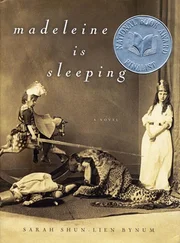Powers that Jonathan, too, possessed. His heart went out to the characters in the books they read. He loved Lennie, the lumbering and deadly giant, and would flare up whenever a classmate referred to the character as retarded. He also loved Mercutio. “He’s a wiseass, but he’s a good friend,” Jonathan said, and when they watched the movie, he murmured, “Mercutio’s the man .” He had no patience, however, for Holden Caulfield. “He’s just a mess,” Jonathan said. “I’m sick of him messing up everything he does. He needs to get his act together.” Jonathan’s disgust was such that he made it difficult to continue the discussion. He snorted and interrupted: “He’s a loser! When are we going to be done talking about this stupid book and this stupid guy?” Ms. Hempel was surprised; she had hoped Jonathan would like Holden, might see in him a kindred spirit. How stupid, she realized later, bent over in the faculty bathroom, sobbing, the faucet turned as far as it could go: that is precisely the reason he hates Holden Caulfield.
All the girls loved Jonathan Hamish. They sidled up to Ms. Hempel and whispered, “You know his dad’s gay, right? It’s so sad; he can’t deal with it.” Even at the age of thirteen, they gravitated, these tenderhearted vultures, to the tortured, the afflicted, the misbehaved. They circled around him, wary but ravenous, each hoping that she would be the one who could render him gentle, that he would nuzzle softly in her palm. He was compelling to them in a way that the class jokers and malcontents and spastics could never be; he was bad in some permanent and profound way. What set him apart was his shame; he took no pleasure in his bad behavior. When his classmates gleefully recounted his misdeeds — Jonathan chucked a blueberry bagel at Mr. Kenney’s head! Jonathan got sent out of theater class for the sixteenth week in a row! — he would retract into himself, refusing to look at Ms. Hempel, his face darkening. He never felt the triumph that the other kids believed was his due. Instead, Jonathan seemed wearied by his bad behavior; the struggle that took place within him was daily and exhausting: she could see it, wracking his slight frame, leaving those ashy moons beneath his eyes. Some days he would grip the edge of his desk, his knuckles blanching, as if a fierce and implacable storm were threatening to tear him away. Ms. Hempel found herself touching his shoulder during class for fear of losing him, and in the hope that the weight of her hand might somehow serve as anchor.
But he was not here at the show. Ms. Hempel’s eyes combed through the rows of faces, though she knew she would not find him.
Harriet now took the stage. Her cape wafted behind her as she guided her little card table into the spotlight. Harriet Reznik, precious artifact of another age! Her thick, swingy helmet of hair, the bangs that looked as if they had been cut with the help of a ruler. Her clanging lunch box. Her indifference to television. Her adventure books, whose child heroes discovered buried treasure and tumbled down waterfalls and toppled tyrannical governments. Her stories of Christmases in Canada, the tangerine peels burning in the fireplace, the giant footprints she left in the field: an experiment with a pair of ancient snowshoes. Her cousin Wilfred, with whom she made trouble and renovated a tree house and took swimming lessons in a very cold lake. Her guinea pigs, her magic tricks. She filled Ms. Hempel with wonder.
Harriet shrugged back the satin folds of her cape and plucked from the front pocket of her jeans a coin, which she held up for the audience to see: “Here before you now is a quarter. A regular, normal, twenty-five-cent quarter.” Ms. Hempel smiled; Harriet Reznik — exuberant soul, mischief maker, jumper up and down — did not like speaking in front of crowds. She kept her eyes fastened on the quarter; she spoke in the breathless, uninflected rush of small children reciting poetry. “Before your very eyes, I will make this quarter disappear.” She waved the coin mechanically above her head, as if spraying a room with insect repellent. “Disappear into thin air,” she repeated, and gulped. Her wrist flicked; her hand curled into itself; the cape shivered. Then, miraculously, the coin was gone. Blinking rapidly, Harriet held her palm out for the audience to examine: “Behold! No more quarter.” She checked her hand as if she did not quite believe it herself, and for the first time she smiled. “No quarter!” She patted the air with her outstretched palm, and the audience clapped. A claque of girls in the front row shrilled. “Now, watch closely.” And Harriet Reznik tightened her fingers into a tube, pressing them against her eye like a telescope. “Empty?” She presented the spy hole for the audience to peer through. “Nothing in there?” She righted her fist, so that the telescope transformed back into her hand, gripping a fat bouquet of invisible flowers. With the unemployed hand she dipped into the fist, from which she extracted, in a single fluid gesture, a length of red silk. It floated in her fingers. “Magic,” Harriet Reznik said.
“I bet she’s going to be gay when she grows up,” Mimi Swartz, the head of the art department, had once predicted. Mimi was gay, too. And Harriet certainly was different from all the other girls in the seventh grade; she was without fear, utterly uninterested in the opposite sex, never betraying even the smallest flicker of self-consciousness. She fancied herself an incorrigible troublemaker. Ms. Hempel went to great lengths to encourage her in this role: “Harriet Reznik, why do you plague me so?” she would exclaim, rolling her eyes up toward the heavens. Harriet liked to dart into Ms. Hempel’s office during recess and distract her from her grading. “Harriet Reznik, you are the bane of my existence!” Ms. Hempel would say, and Harriet would cackle delightedly. She had a battery of pranks — finger traps, squirt rings, fake rattlesnake eggs — all of which she practiced upon Ms. Hempel. “Want some gum, Ms. Hempel?” she’d coo, offering a piece encased in a suspiciously generic wrapper. Her teacher would reach out her hand, allow it to hover over the stick of gum, and then, after a moment had passed, plant both fists on her hips: “Are you crazy? I know the way that mind of yours works!” Ms. Hempel would exhale, as if she had just had a close call. “Harriet Reznik,” she would say, eyes narrowing. “I wouldn’t trust you as far as I could throw you.”
But she didn’t like to think of Harriet Reznik being gay. Not because she had any misgivings about gayness; she just didn’t like to think of Harriet becoming a grown-up. A selfish, terrible part of her didn’t want to see any of her kids get bigger. Yes, she wanted to see Adelaide emerge from the wings, as luminous as a moonbeam. Yes, she wanted Jonathan to sleep well; she wanted Edward Ashe to travel the world, blowing on his didgeridoo, adopting rare reptiles and spiders wherever he went. She wanted to see Harriet Reznik make whole elephants disappear. But Ms. Hempel couldn’t bear to think of them not being exactly as they were now, as she knew them. She wanted them to stay in middle school forever.
Ms. Hempel had once believed, foolishly, that teachers liked to watch their students grow up. She had written letters to the teachers she loved most, to tell them of her progress, her becoming. Upon graduating from college, she had even telephoned Mr. Mellis, who had taught her creative-writing class in the eleventh grade. “I’m going to be a teacher, too!” she announced breathlessly over the phone. She waited for his ecstatic reply. The silence hissed over the long-distance connection. “Well,” he said, finally. “If you ever had a novel in you, Beatrice, it’s certainly not going to come out now.” And now she sat here, in her brown lipstick, on a folding chair, and wondered: would she ever write a novel, or sing in a band, or foment a revolution?
Читать дальше












